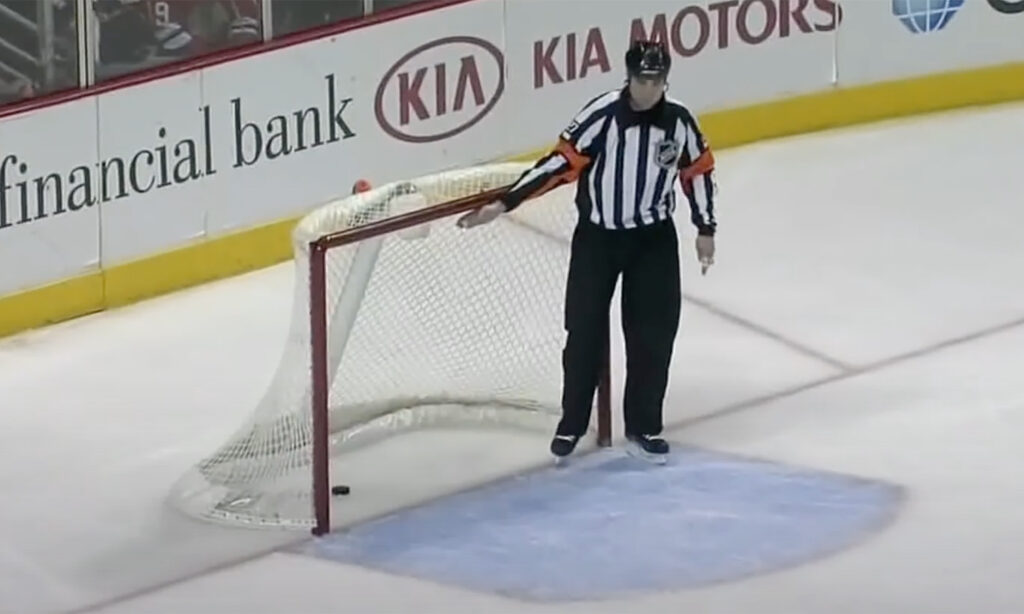When you first learn about hockey, the understanding is that each team starts with 6 players on the ice.
That is, one goalie and 5 skaters made up of three forwards and two defensemen.
As you pick up more of the game, you realize that players can get penalties, leading to one team gaining a numerical advantage over their opponents.
But not all numerical advantages are due to powerplays.
An advantage can be created using an empty net strategy.
What does Empty Net in Hockey mean?
An empty net in is when the goalie is pulled during play for an extra skater. It is a strategy employed by teams to give them a numerical advantage for the purpose of scoring on the opposition. An empty net is also commonly referred to as a "yawning cage" in hockey lingo.
There are several scenarios in which the Empty Net strategy is employed. They are most common during delayed penalties and while teams are trailing in score.
I also give an example of the more unlikely situation in which a team is trying to qualify for the playoffs. These can be whacky!
Delayed Penalty
Teams will often pull their goalie when a delayed penalty is being called on their opponents.
In essence, if the opponent draws a penalty without being in possession of the puck, the referee will signal a delayed called with their arm.
So long as the opposition doesn’t gain control of the puck, the play will continue until they do or due to regular stoppage of play.
As such, the offended team will use this temporary advantage for a scoring opportunity.
Pulling the goalie will give them an additional player boost as they now have one more skater than their opponent.
But leaving your net empty on a delayed penalty does come with some risk.
While your opponent cannot grab hold of the puck and shoot it at the open net, your own player can accidently.
That is, the offended team can slide the puck into their own net and it will count as a goal for the opposition.
This scenario has happened on a few occasions, typically due to an errant or missed pass.
The play will leave you wondering who on the opposite team gets credit for the goal.
And the answer to that is, the last player to have possession from the opposition.
Trailing in Score
The most common scenario to having an empty net is when your team is trailing on the scoreboard.
When time becomes your enemy and your team needs a goal or two to tie the game, that is an ideal situation to pull your goaltender.
You’ll see the goalie coming out with less than 1:30 (1 minute and 30 seconds) left in the game.
The risk is even greater than on a delayed penalty, because your opponent can gain control of the puck and attempt to score themselves.
The trailing team will usually pull their goalie when they have possession of the puck or if the faceoff takes place in the offensive zone.
I’ve personally seen coaches pull their goalie even earlier in the game, for far greater deficits than two goals.
The game of hockey can get wild at times!
Teams, at times, take traditional strategy and throw it in the garbage, leaving fans scratching their heads.
If it pays off, the team and coach look brilliant, but that’s incredibly rare.
Clinching Playoff Spot
Speaking of rare, there can be situations in which a team pulls their goalie for the empty net without trailing in score.
This is extremely rare and would only happen when that team is looking to clinch a playoff spot on the very last game of the season.
One scenario is that the team must beat their opponent in regulation time.
If not, that extra point awarded (in the standings) to their opposition in overtime will knock them out of playoff contention. Regardless if the original team wins the game in the end.
Example:
Canadiens – 96 points
Bruins – 97 points
Bruins hold the edge in case of a tie-breaker in the rankings. In this hypothetical situation, they currently sit in the last playoff spot.
If the Canadiens win in regulation, they make the playoffs with 98 points to the Bruins 97 points.
However, if the Canadiens win in overtime, both teams would finish with 98 points.
The Canadiens would miss the playoffs in this scenario.
So, if the game were tied with minimal time left in the third period, the Canadiens would be highly motivated to pull their goalie to win in regulation time.
Another scenario is if goal differential plays a factor for making the playoffs.
In essence, the team not only needs to win the game, but must do so with a large goal margin.
I won’t give an example here, because the situation is extremely unlikely.
However, you can imagine that teams would employ empty-net tactics to secure a playoff spot.
Is it ever illegal to have an empty net?
Teams can pull their goalie for an empty net during play at any time, even during overtime.
However, during the regular season, if the team pulls their goalie in overtime and lose the game, they also give up the Overtime Loss point.
That point can affect them in the standings, especially for teams looking to make the playoffs.
So, while it is not illegal to pull the goalie in overtime, it is highly discouraged by the NHL.
As for playoff overtime, teams can pull their goalie as they please, but the penalty is much worse if they gamble and lose.
Since overtime playoffs is sudden death, the next goal scored costs you the match and a game in the series.
The only scenario where you pull the goalie in playoff overtime is, again, on a delayed penalty call.
But don’t be that player to score on your own net. That is not only catastrophic to the team, but to that very player’s psyche.
Final Thoughts
When teams pull their goalie for the empty net, there’s nothing more stressful for the average hockey fan.
Whether you are rooting for the trailing or winning team, those last moments in the third period can be heart-pounding.
Seeing your team give up the tying goal with less than a second on the lock, and then losing in the subsequent overtime or shootout is the worst feeling in the world.
But when you’re on the opposite side of the lens, that tying goal can provide great relief.
The feeling is that your team didn’t deserve to make it to overtime, but you’ll take the overtime point nonetheless.
Empty net scenarios are not for the faint of heart.






